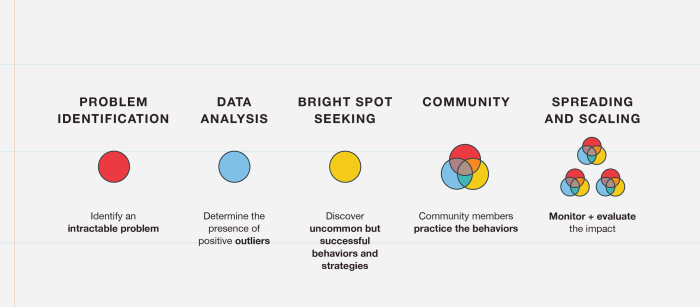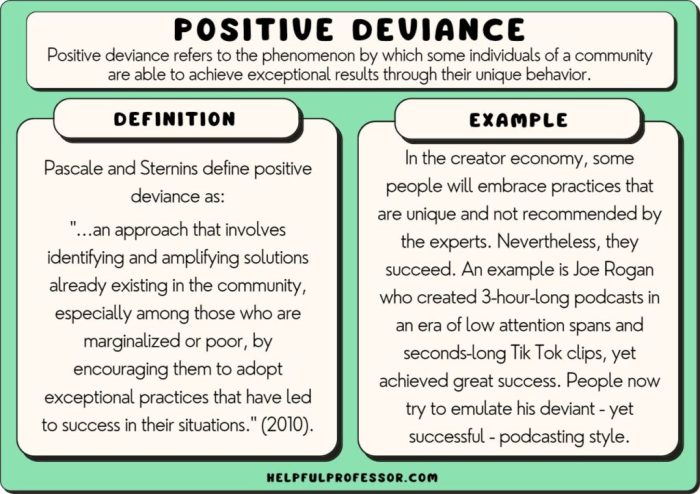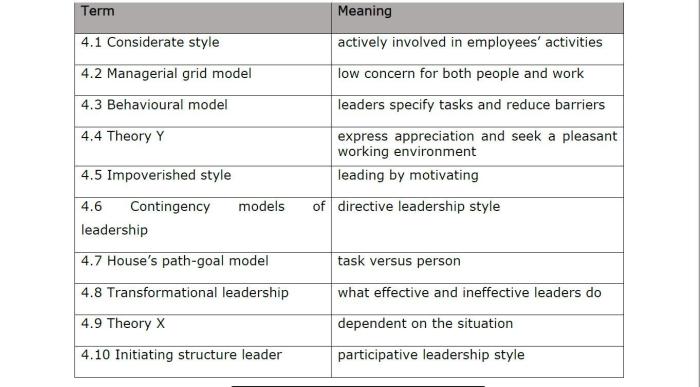Organizations should work to discourage positive deviance in the workplace to foster a harmonious and productive work environment. Positive deviance, while seemingly beneficial, can disrupt team dynamics, undermine authority, and lead to resentment and decreased productivity. This article explores the detrimental effects of positive deviance, strategies for discouraging it, and the benefits of maintaining a workplace culture that values conformity and adherence to norms.
Detrimental Effects of Positive Deviance in the Workplace

Positive deviance, while often associated with innovation and creativity, can have detrimental effects on workplace harmony and productivity. When individuals or teams deviate significantly from established norms and expectations, it can disrupt team dynamics, undermine authority, and create resentment.
Disruption of Team Dynamics
Positive deviants may challenge established work processes and procedures, leading to conflicts and inefficiencies. Their non-conformist behavior can create a sense of isolation and alienation among other team members, hindering collaboration and teamwork.
Undermining Authority
When positive deviants consistently disregard or challenge authority, it can erode the trust and respect necessary for effective leadership. Their actions can create a sense of disorder and undermine the authority of managers and supervisors, making it difficult to maintain discipline and accountability.
Resentment and Decreased Productivity
Unchecked positive deviance can lead to resentment among team members who feel that their efforts are not being recognized or rewarded. This can result in decreased motivation and productivity, as individuals may feel that their contributions are not valued.
Strategies for Discouraging Positive Deviance

To mitigate the negative consequences of positive deviance, organizations should implement strategies to discourage such behavior. These strategies include setting clear expectations, fostering a culture of accountability, and promoting open communication.
Setting Clear Expectations and Boundaries
Organizations should clearly define acceptable behaviors and expectations for employees. This can be done through written policies, performance evaluations, and regular communication. By establishing clear boundaries, individuals are less likely to engage in positive deviance.
Fostering a Culture of Accountability
Organizations should create a culture where individuals are held accountable for their actions and decisions. This includes providing regular feedback, setting performance goals, and addressing positive deviance in a timely and consistent manner.
Promoting Open Communication, Organizations should work to discourage positive deviance in the workplace
Open communication is crucial for addressing positive deviance. Managers should encourage employees to voice their concerns and provide feedback on the behavior of others. This creates a safe and supportive environment where positive deviance can be discussed and addressed constructively.
Benefits of Discouraging Positive Deviance

Discouraging positive deviance can have numerous benefits for organizations, including improved workplace efficiency, enhanced team cohesion, and long-term organizational stability.
Improved Workplace Efficiency
When positive deviance is discouraged, employees are more likely to adhere to established processes and procedures, leading to increased efficiency and productivity. By eliminating distractions and conflicts, organizations can streamline operations and achieve better results.
Enhanced Team Cohesion
Positive deviance can disrupt team dynamics and create a sense of isolation among team members. By discouraging such behavior, organizations can foster a more cohesive and collaborative work environment, where individuals feel valued and supported.
Long-Term Organizational Stability
Maintaining a culture that values conformity and adherence to norms promotes long-term organizational stability. When employees understand and respect established boundaries, they are less likely to engage in disruptive or unethical behavior, creating a more stable and predictable work environment.
Answers to Common Questions: Organizations Should Work To Discourage Positive Deviance In The Workplace
What is positive deviance?
Positive deviance refers to behaviors or actions that deviate from the norm in a positive way, often leading to improved outcomes.
Why should organizations discourage positive deviance?
Positive deviance can disrupt team dynamics, undermine authority, and lead to resentment and decreased productivity if left unchecked.
How can organizations discourage positive deviance?
Organizations can discourage positive deviance by setting clear expectations, fostering a culture of respect and open communication, and providing support for employees to conform to norms.
